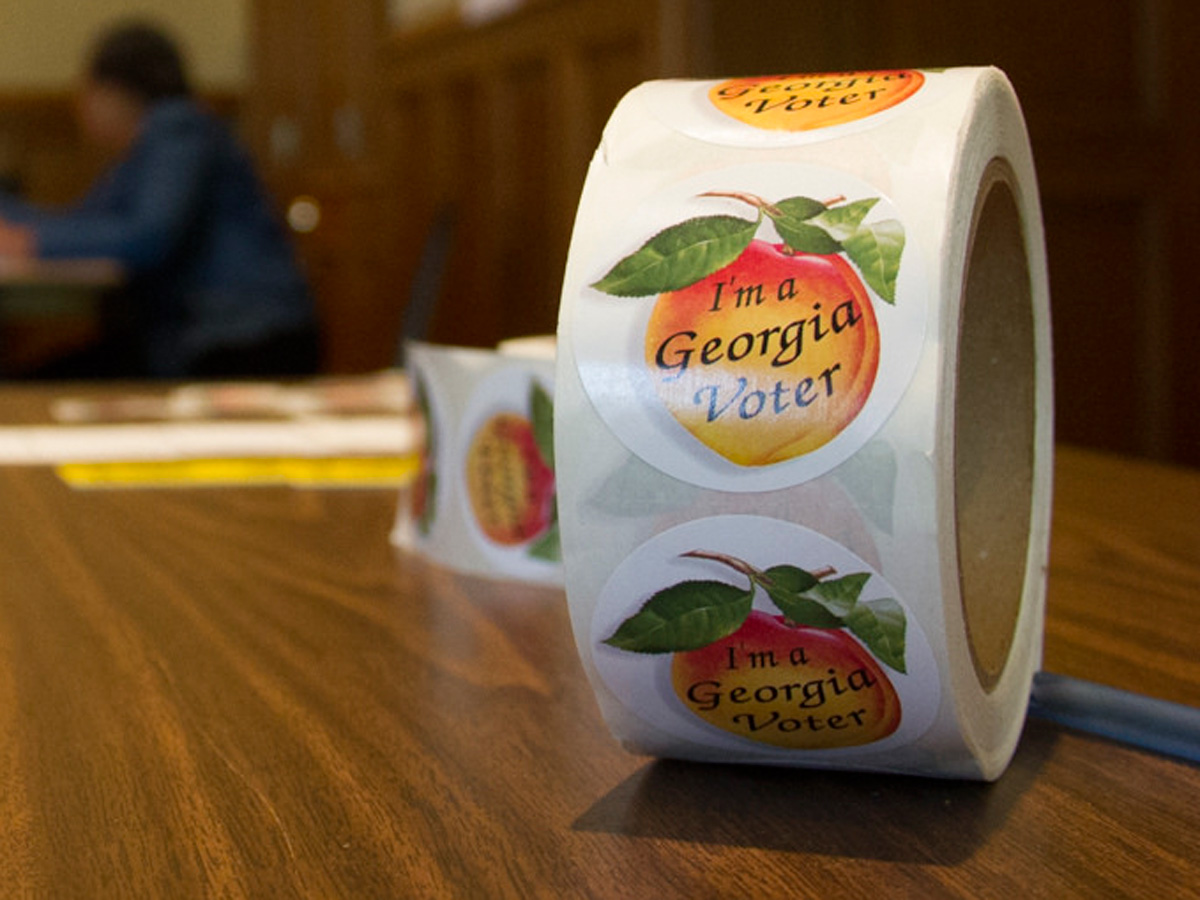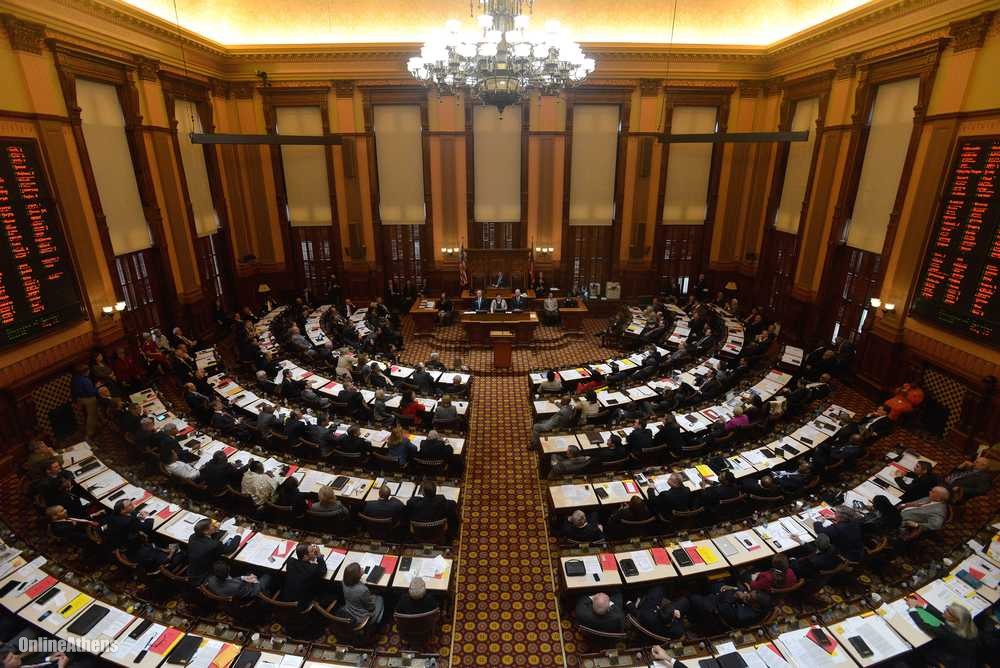By: Cecilia Moore
Spencer Frye is the Democratic candidate for the 118th district of the Georgia State House, which encompasses Athens and half of Clarke County. He came to UGA in 1986 and has lived in Athens ever since. He has worked for Athens’ Habitat for Humanity since 1999 and is now the organization’s executive director. Before that he started up and co-owned Envirotech and was a regular in the Athens music scene. On October 23, he sat down with Cecilia Moore of Georgia Political Review to discuss his hopes for the Georgia State House of Representatives and his stances on many pressing local and state issues.
You ran for mayor of Athens in 2010. What did you take from that race and what led you to run for office again?
The amount of support that we had for that particular race was incredible. A lot of folks put a lot of effort, a lot of hope, into my candidacy. I learned that people were hungry for new leadership in this community, and I was humbled by that, and it’s a great burden that I take extremely seriously. Why am I running for state house? Why did I run for mayor? It’s for the same reason: to expand the opportunities I have to offer more opportunities to our community. In my day-to-day work, I see hard working Athenians who just want a chance. The 118th district is probably one of the highest poverty districts within Clarke County. And then Clarke County has the highest poverty rate in the whole United States for metropolitan areas over 100,000. So essentially, you could say that this district represents ground zero of the poverty issue in America. I’ve been working with low-income individuals for the past thirteen years, and I see this as an opportunity to expand their opportunities and to be a voice for people who I don’t think necessarily have one.
You ran against an incumbent of twenty-plus years in the Democratic Primary. Is that what led you to run against him? Since in your campaign for that race, you said you were much more connected to the community than he was and that he had become more consumed with Atlanta.
Yes, not to move backwards, always looking forwards, but there [have] been, in the past, leadership that have lost their connection to a large part of the community. We felt that it was our opportunity to point out that there had been some decisions and some folks that didn’t benefit the constituency in this community and we needed someone who was going to pay attention to the folks in this community. Specifically, the 118th district has most of the industrialized land in Athens-Clarke County. We already have great infrastructure, we already have sewer and water set up, we’ve got land that’s not being used. Let’s utilize this opportunity we’ve got with Caterpillar and bring new opportunities to the area. Caterpillar is here, there’s another division of Johnson & Johnson called Ethicon that is putting a $200 million plant…We’ve got a great educated work force, we’ve got great opportunity, we’ve got some great tax incentives in the state of Georgia … let’s get it going.
So, why do you think it’s been hard then for industries to come here? There have been other instances when companies haven’t taken the bait and moved here, and they’ve cited that they weren’t impressed by the work force. What sort of deterrents do you think were in the way then?
We’ve heard for the past two decades that we’ve lost a major part of our manufacturing sector in Athens and the surrounding area. A lot of that [was] due to what was going on at the time. We had cheap fuel prices so it was less expensive to make something outside of the country and ship it back in. And as we are seeing our fuel prices increase, its definitely putting a different type of pressure on. Our natural gas resources in this country are expanding, which is suppressing energy costs. So, I think that we’re going to see in the next ten, twenty years a resurgence in our manufacturing within the whole country. I want Georgia to be ahead of that curve, and I want Athens to be ahead of the Georgia curve. And it definitely hurts that for two decades we didn’t have an educated work force. We’ve worked really hard in the past five years to rectify that… And I think that Caterpillar and Johnson & Johnson coming to Athens and expanding in Athens blows the uneducated work force argument out of the water.
In this national election and in many previous ones, people have asked how the federal government plans to increase job growth, as it’s always put on the president’s shoulders to do so. But do you think that the state in a better position to bring jobs to its region than the national government?
I feel that it’s the government’s role to create an atmosphere for business to flourish. And I think that that’s extremely important. Whether it’s through certain tax incentives or certain codes that might need to be tweaked a little bit. I’m certainly not speaking of environmental codes, though. I’m referring to construction and zoning codes. And specifically on the local level I think there are a couple things we can do to create opportunities for businesses to want to come to Athens, at least make it a little simpler. We’ve got a great government here; the management is fabulous. Our city workers are excellent, and if we just tweak a couple rules, then businesses will come here.
You just mentioned environmental codes, and I know you have an environmental background. Do you view Georgia as being an environmentally friendly state, or do you think there’s a lot of progress to be made through state legislation?
I think there are a lot of things we can do to move ourselves forward environmentally. I was a co-owner of an environmental company. We did it because we appreciate the environment but also because there was profit to be made in doing what we did. And I think there has got to be that balance. The private sector has to play a huge role in the market… I’d like to see some of our water laws [be] a little more stringent. As we’ve witnessed, four years ago we had the droughts across the state and people really figured it out that as our population grows, it’s going to put even more pressure on the water we use. So that’s another thing we should look at. I’d like to see the private sector come in and handle our solar power a little better. I know Georgia Power made a good first step recently with the deal they put up. But let’s kill two birds with one stone. Let’s create a whole bunch of jobs by recruiting a bunch of solar panel manufactures and let’s reduce our energy costs at the same time. I think it’s just going to take a little bit of outside the box thinking and foresight.
So your background, which you’ve touched on, is business. How do you think it will prepare you to be in a legislative body, a law making body, when you don’t necessarily have a law or policy-making background?
Right, I think it’s important to show that if you’re making rules about peoples’ lives that having had lived those lives and walked in those shoes is very important. Obviously, my background is in entrepreneurship and small business… I’ve been a construction worker, I’ve been an executive, an environmentalist; and, I think it really gives me good insight to the business sector… Making sure we, as a legislative body, are not hindering businesses from growing is definitely going to be a priority.
Over the course of your campaign, has your platform evolved at all? Have citizens come to you with concerns or thoughts that you weren’t necessarily concerned about that have affected your views?
I can’t specifically think of where any of my platforms have evolved. My two biggest concerns that I think are so linked together and that we should focus on as a state are education and economy… If we had a higher educated work force in Georgia, they would attract business, and with that boost in tax revenue, the state could reinvest that money into more infrastructure and education. What we think is that this hurts right now and so we don’t take those steps to fund education and the workforce gets a little less educated and they get lower paid jobs, and it’s a downward spiral. Yeah it might hurt for a couple of years, but I think we would see the returns in the future. And it would be a really positive situation.
So do you think there is any chance for the HOPE scholarship, which many Georgians are scared might disappear? What do you think the state can do to stop the decrease in its funding?
We’ve got to look for alternative financing for HOPE. At the same time, HOPE was originally means tested. It was designed for low-income families to be able to send their kids to school, and after a couple of years it got changed for everybody. I’d like to see some sort of a family income cap on that, what exactly I’m not sure. But I don’t think it’s a coincidence that every year that HOPE gets cut we see a decrease in our university population and a decrease in our minority and low-income university students as well. And I don’t think that’s a coincidence… I think we should look at this not as a negative but as a positive opportunity to get leaner to get more efficient and to do more with less and maintain these standards of excellence across the board.
That does seem sort of difficult in a sense though, because families have to prepare so early for college education because it’s so expensive. And I can’t imagine it being a quick process to get rid of HOPE or to completely change the requirements because even middle class families simply couldn’t be ready for that. You almost need years’ worth of warning that you are going to lose this substantial amount of scholarship money.
Those are tough decisions, and you know where do you make your cuts in a budget shortfall? You either have to figure out ways to increase your revenues, or you have to figure out ways to reduce your expenses. Those are the only two ways the government can work. And those are tough things. I’ve spoken to students who were blindsided by these decisions. It’s not going to get that much easier any time soon. I feel like I can almost guarantee that. For this situation, there’s not going to be a magic bullet. It’s going to be tough, and who even knows if HOPE will even exist by the time my four-year-old daughter is of college age. It’s tough for parents. I just got finished paying off my student loans three years ago. Hopefully there are some solutions in the future that we can look at and definitely I will try to do my best to be an advocate for HOPE because secondary education, and especially our university system, is an investment we need to keep making.

